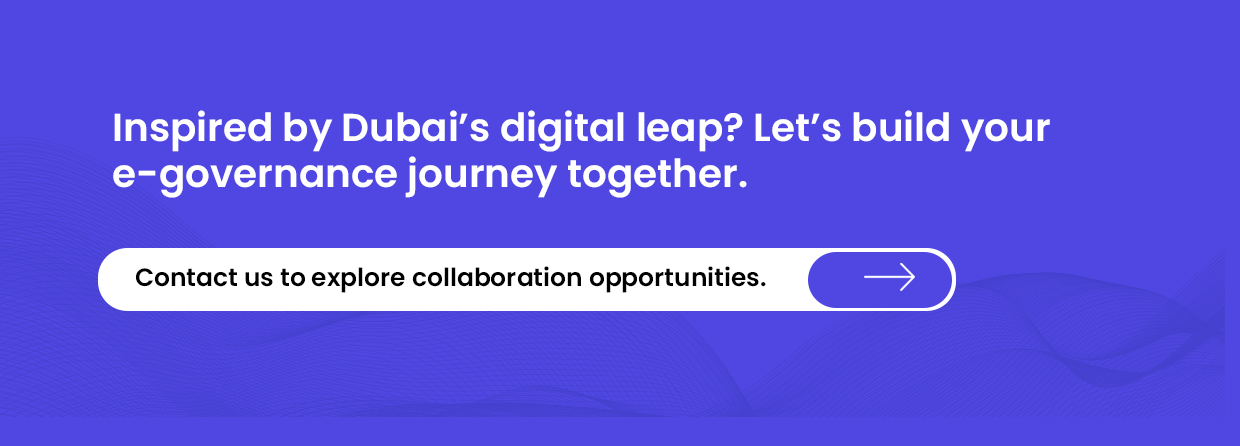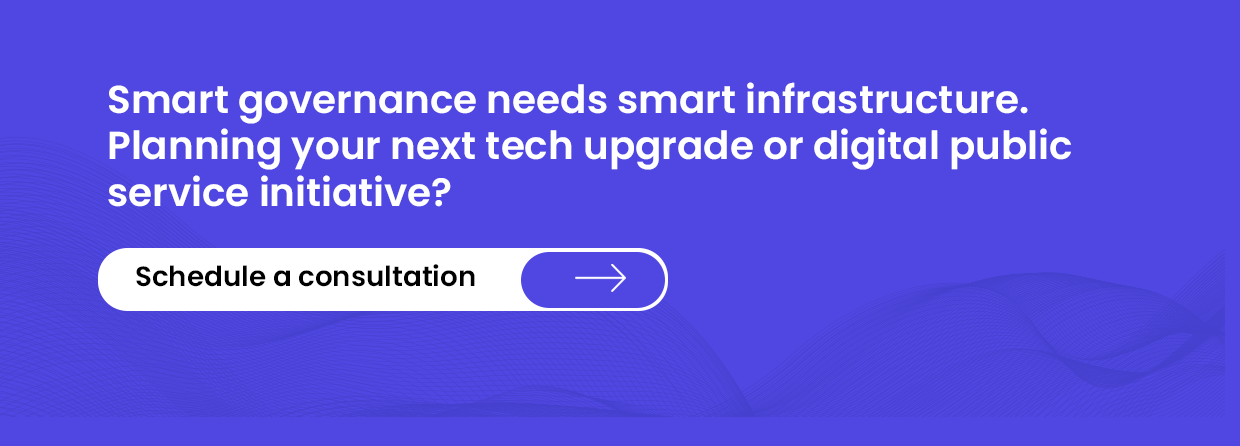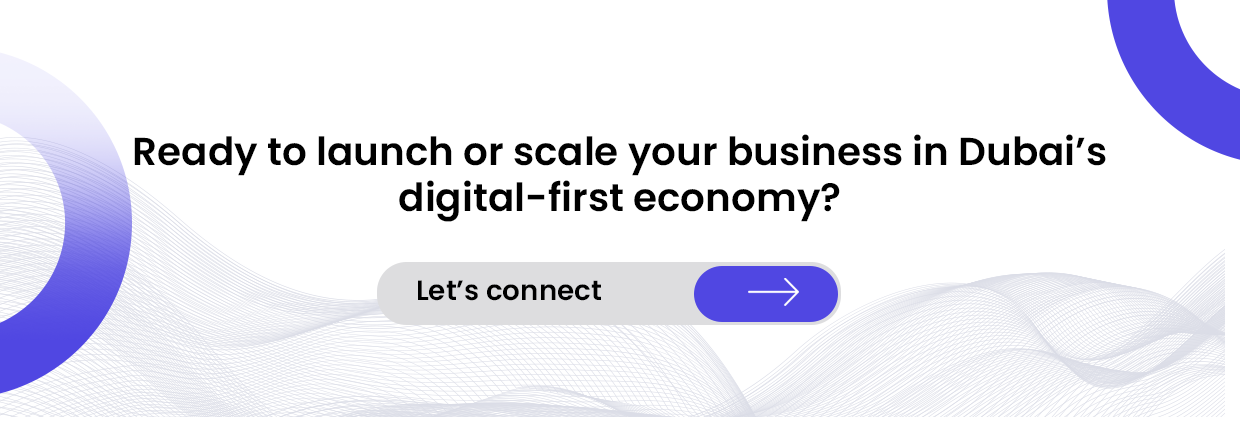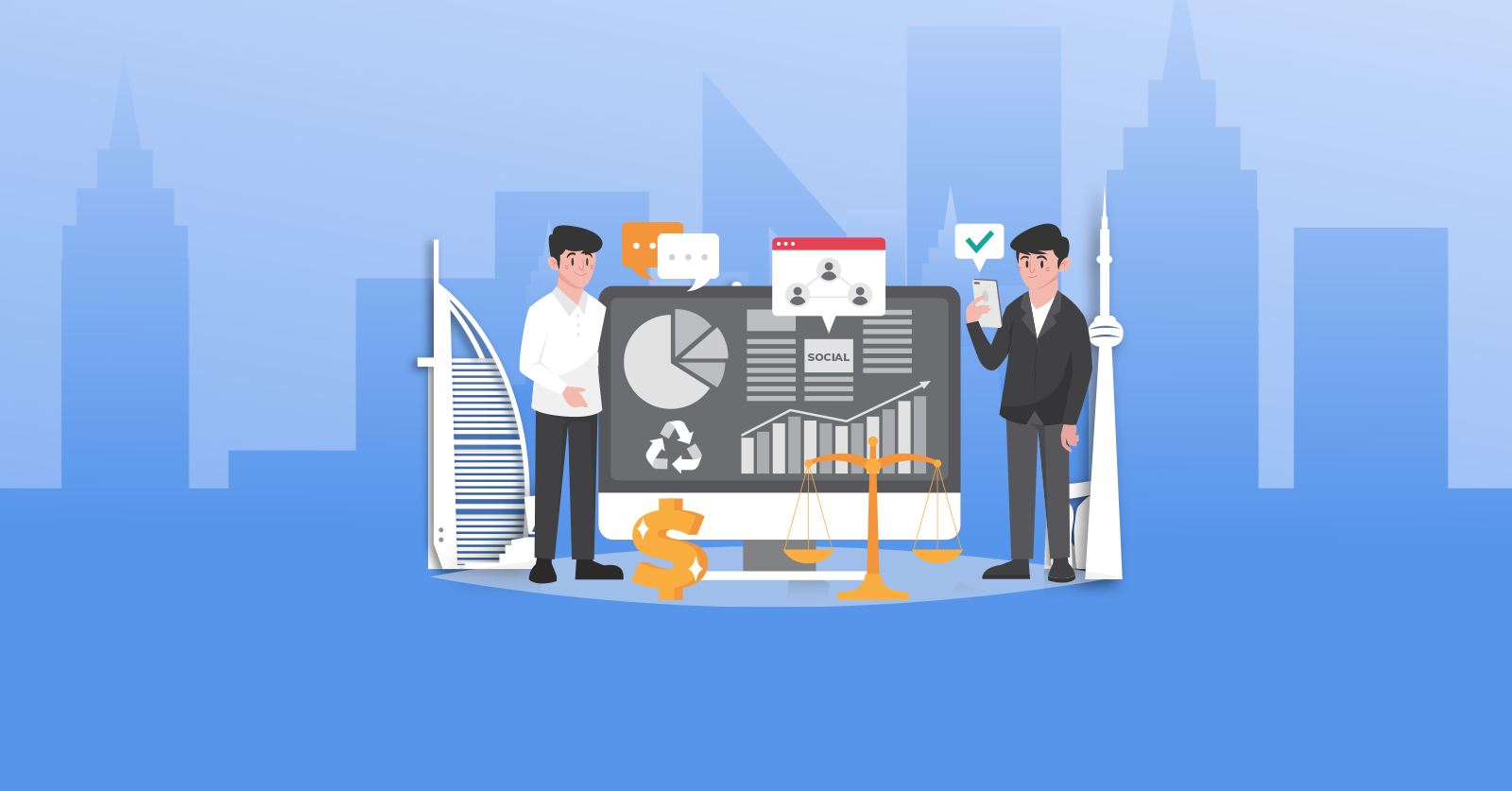
Dubai is rapidly becoming a global blueprint for digital governance. With a bold vision and aggressive tech adoption, the city is redefining how governments can serve people -faster, smarter, and with far less friction. Whether it’s renewing your trade license, accessing healthcare records, or settling a traffic fine, Dubai aims to make every government touchpoint as seamless as booking a cab.
This transformation isn’t just about digitizing services -it’s about rethinking the government-citizen relationship through automation, blockchain, AI, and predictive analytics. At the core of this shift lies a simple but powerful principle: citizen convenience.
In this article, we unpack how Dubai is reshaping e-governance -what technologies are driving this evolution, which services have gone fully digital, and what the world can learn from this bold experiment in the future of public administration.
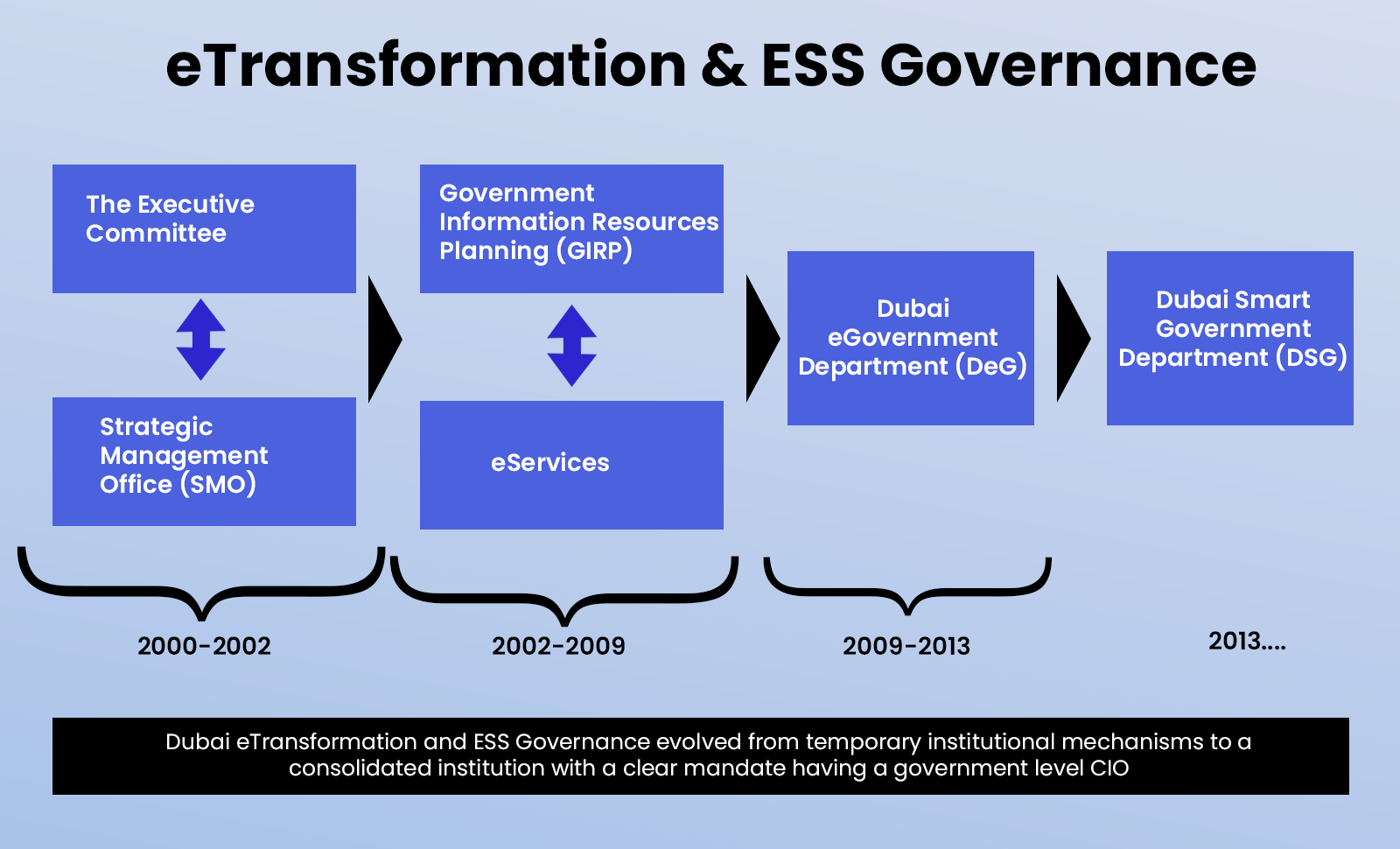
Landmark Initiatives That Showcase Dubai’s E-Governance Transformation
Dubai’s vision for digital governance is no longer aspirational -it is operational. With its ambitious push to redefine how governments interact with citizens, businesses, and global investors, the city has rolled out some of the most comprehensive and pioneering e-governance initiatives in the world. These aren’t isolated pilots but full-fledged, cross-departmental reforms with measurable outcomes. Below are the most significant digital initiatives driving this transformation:
1. 100% Paperless Governance Across All Departments
In 2021, Dubai became the first government globally to announce that it had gone completely paperless. This was not just about shifting forms online -it involved a full revamp of internal and citizen-facing processes across 45 government departments. Through the Dubai Paperless Strategy, over 336 million papers were eliminated, resulting in savings exceeding AED 1.3 billion and over 14 million hours of manpower. Every interaction -whether filing taxes, renewing a trade license, or applying for a visa -is now conducted digitally through platforms like DubaiNow, a centralized citizen portal offering over 130 services, and UAE Pass, a national digital identity used for authentication and document signing.
2. Blockchain-Enabled Transactions Across Sectors
Dubai was among the first cities globally to embrace blockchain as a core pillar of government. Under the Dubai Blockchain Strategy, spearheaded by Smart Dubai and the Dubai Future Foundation, blockchain has been adopted across key public departments:
- Dubai Land Department uses it to manage real estate title transfers and ownership verification.
- Department of Economic Development (DED) integrated blockchain to streamline business license issuance and verification, reducing fraud and delays.
- Dubai Customs implemented it to monitor cross-border cargo with real-time tracking, improving transparency in supply chains.
The impact? Document authentication and contract validation times have been slashed from days to minutes, and interdepartmental verification processes have become tamper-proof.
3. AI-First Approach in Public Interfaces
AI is not just a buzzword in Dubai -it powers public services in real time. The government-backed Smart Dubai AI Lab, in collaboration with IBM and the private sector, has built intelligent systems that enhance everything from user support to infrastructure planning. One such tool is Rashid, an AI-driven virtual assistant that helps residents and visitors navigate government procedures like visa applications, housing registration, and business licensing.
AI also underpins:
- Predictive policing, with the Dubai Police using facial recognition, behavioural analytics, and AI-based surveillance to preempt crimes.
- Smart DEWA Grid, where the Dubai Electricity and Water Authority uses AI to predict demand, detect outages before they happen, and optimise energy distribution.
4. NABIDH – Unified Health Record Integration
NABIDH (National Unified Medical Record) connects all public and private healthcare providers in Dubai, ensuring that any healthcare professional -public or private -has real-time access to a patient’s history, diagnostics, and medications. This system has been transformative for emergency care, chronic disease management, and public health surveillance. For instance, it played a central role during the COVID-19 pandemic by enabling seamless coordination between testing centres, hospitals, and public health authorities.
The system also adheres to strict compliance standards, with end-to-end encryption and data residency laws, aligning with both UAE and global health data regulations.
5. e-Residency and Fast-Track Business Incorporation
Dubai has dismantled traditional bureaucracies around company formation. Today, both residents and global entrepreneurs can start a business in under 15 minutes using the Invest in Dubai platform. The process is entirely digital -from name reservation to trade license issuance -without the need to visit any physical office. Beyond this, the city has introduced:
- e-Residency for virtual companies, enabling foreign entrepreneurs to set up businesses remotely.
- Unified digital licensing, where approvals across departments (e.g. municipality, civil defense, health) are processed through a single application.
This initiative has drastically increased foreign investor participation and made Dubai one of the easiest places globally to launch a business digitally.
6. 24/7 Contactless Policing and Smart Stations
The Dubai Police have introduced Smart Police Stations (SPS) -autonomous units that operate round-the-clock with no human personnel. Residents can walk into one of these pods and report crimes, pay fines, or even request certifications. With more than 30+ services automated, these units reduce queues, improve accessibility in remote areas, and offer multi-language support.
They also integrate with the Oyoon AI surveillance system, which uses computer vision to monitor public spaces, detect unusual behaviour, and raise alerts in real time.
7. Digital-First Mobility and Infrastructure
Dubai’s Roads and Transport Authority (RTA) is at the forefront of smart mobility. Some key components include:
- AI-controlled traffic lights that adjust in real time based on congestion levels.
- Smart Parking Systems that notify users of empty spots via app.
- Autonomous vehicle trials, including robo-taxis, in partnership with global firms like Cruise and Zoox.
- Integration of all public transport -metro, bus, tram -under a single Nol card system and RTA app.
Together, these technologies reduce commute times, improve fuel efficiency, and support the city’s broader sustainability goals.
Technology Backbone: What Powers Dubai’s E-Governance?
Dubai’s ambitious e-governance transformation rests on a sophisticated and integrated technology ecosystem, combining cutting-edge infrastructure, emerging technologies, and a strong emphasis on security and scalability. This technology backbone not only supports the day-to-day operations of government services but also drives innovation and citizen-centric improvements.
Cloud-Native Architecture and Smart Platforms
The government of Dubai has shifted towards cloud-first infrastructure, leveraging platforms like Microsoft Azure, AWS, and local cloud providers to ensure scalability, reliability, and fast deployment. This enables dynamic resource allocation for fluctuating workloads, such as high-traffic periods in government portals or emergency response systems. Cloud adoption also supports rapid integration of new applications and cross-department data sharing, a key enabler for seamless service delivery.
Blockchain Infrastructure
At the core of Dubai’s blockchain initiatives is the use of Hyperledger Fabric and Ethereum-based frameworks, tailored for enterprise-level governance applications. These blockchain networks enable immutable, transparent, and auditable records across multiple agencies without compromising data privacy. The Dubai Blockchain Strategy includes a government-wide Permissioned Blockchain Network where verified entities participate, ensuring trust and interoperability.
Artificial Intelligence and Machine Learning Engines
Dubai leverages AI models developed both in-house at the Smart Dubai AI Lab and through partnerships with global tech giants like IBM, Microsoft, and Google. These AI systems run on TensorFlow, PyTorch, and other ML frameworks to power services ranging from natural language processing (NLP) chatbots to predictive analytics for traffic and utilities management. The city is also experimenting with reinforcement learning for optimizing resource allocation and computer vision for smart surveillance and public safety.
Internet of Things (IoT) and Edge Computing
IoT sensors and devices are deployed extensively across the city, from smart meters and environmental sensors to connected traffic lights and parking systems. These devices feed real-time data into centralized control hubs that use edge computing to process data locally for immediate action, reducing latency and bandwidth usage. The RTA’s traffic management system and DEWA’s smart grids are prime examples of how IoT enhances responsiveness and operational efficiency.
Cybersecurity and Data Privacy Frameworks
With increasing digital interconnectivity, Dubai has invested heavily in cybersecurity. The Dubai Cyber Security Strategy mandates strict protocols, including multi-factor authentication, end-to-end encryption, and real-time threat detection powered by AI-driven Security Information and Event Management (SIEM) systems. The city also complies with UAE’s Personal Data Protection Law (PDPL) and international standards like GDPR, ensuring citizen data privacy while enabling responsible data sharing.
API-First and Microservices Architecture
Government applications are built using microservices that communicate via secure APIs, allowing independent development, testing, and deployment of service modules. This modularity supports continuous improvement without disrupting user experience. The API gateway architecture facilitates integration with third-party services, encouraging innovation and private sector collaboration.
Digital Identity and Authentication Systems
The UAE Pass is Dubai’s nationally recognized digital identity platform, allowing residents and visitors to securely access government services, sign documents digitally, and authenticate transactions. It integrates biometric verification, mobile ID, and blockchain-backed validation to offer a seamless yet secure user experience.
Together, these technologies form a resilient, flexible, and citizen-centric infrastructure that empowers Dubai’s government to deliver smart, efficient, and innovative services at scale.
What Dubai’s E-Governance Revolution Means for Entrepreneurs and New Entrants
Dubai’s comprehensive e-governance initiatives are not just about digitizing government services – they fundamentally reshape the business environment, creating a more transparent, efficient, and innovation-friendly ecosystem. For entrepreneurs and companies looking to establish or expand their presence in Dubai, this digital transformation opens up several compelling opportunities and advantages.
Streamlined Business Setup and Licensing
The digitization of business registration, licensing, and permit processes drastically reduces the time and effort needed to start or grow a business in Dubai. Entrepreneurs can complete complex government procedures online via portals like DubaiNow or the DED Smart Services platform without physical visits, saving weeks or even months of paperwork and bureaucratic delays. This speed and simplicity encourage more startups and foreign investors to explore Dubai’s market with greater confidence.
Access to Data-Driven Insights and Services
Dubai’s integrated digital infrastructure offers businesses access to a wealth of government data and analytics tools (often through APIs and portals). Entrepreneurs can leverage this data to make informed decisions – from market trends to customer behavior and regulatory compliance. Such access empowers companies to design targeted offerings, optimize operations, and anticipate market needs more effectively.
Enhanced Regulatory Transparency and Predictability
E-governance platforms provide real-time updates on policy changes, regulations, and compliance requirements, reducing uncertainty and risks associated with regulatory ambiguity. For startups and SMEs, this transparency means fewer surprises and easier adaptation to Dubai’s evolving business landscape, helping them stay compliant while focusing on growth.
Opportunities for Tech-Driven Innovation and Partnerships
Dubai’s government actively encourages collaboration with private sector innovators through initiatives like the Dubai Future Accelerators and Smart Dubai Challenge. Entrepreneurs specializing in AI, blockchain, IoT, and other emerging technologies can find fertile ground to pilot solutions that align with Dubai’s smart city goals. Being part of this ecosystem can open doors to funding, mentorship, and scaling opportunities.
Improved Customer Experience and Market Access
Digital transformation of government services translates into smoother interactions with regulatory bodies, banks, and service providers. Entrepreneurs benefit from quicker approvals, easier cross-department coordination, and faster dispute resolution, all of which enhance operational efficiency and customer satisfaction.
Focus on Cybersecurity and Data Privacy Compliance
While the digital ecosystem offers numerous benefits, businesses must align with Dubai’s strict data protection and cybersecurity standards to maintain trust and legal compliance. Entrepreneurs should be prepared to invest in robust security practices, which also become a competitive advantage in an increasingly data-conscious market.
Global Visibility and Competitive Edge
Dubai’s leadership in e-governance enhances its reputation as a global business hub committed to innovation and efficiency. Companies that leverage digital government services gain credibility and positioning that can facilitate regional expansion and attract international clients or partners.
For entrepreneurs and new market entrants, Dubai’s e-governance is more than a convenience – it’s a strategic enabler that accelerates market entry, fosters innovation, and supports sustainable business growth in one of the world’s most dynamic cities.
How Codingworkx Can Support Your Dubai E-Governance Journey
Navigating Dubai’s fast-changing digital government environment requires more than just adopting new technologies -it demands a partner who understands how to align innovative solutions with your unique business goals. Codingworkx offers deep expertise in digital transformation, building scalable, secure, and user-friendly platforms that integrate smoothly with Dubai’s government APIs and services.
From the earliest stages of consulting and system design through agile development, thorough testing, and deployment, we provide end-to-end support that helps reduce your time-to-market and lower risks. We also recognize the critical importance of data privacy and cybersecurity in Dubai’s regulatory framework, so we build robust security and compliance protocols directly into your applications to keep your business data safe and trusted.
Dubai’s smart city vision incorporates IoT, AI, blockchain, and advanced analytics -technologies Codingworkx leverages to help you unlock new growth opportunities and stay ahead in this dynamic market. Beyond technology, we also provide strategic advisory services to help you understand regulations and optimize your operations for success in Dubai’s unique business landscape.
By partnering with Codingworkx, your business can confidently navigate Dubai’s evolving e-governance ecosystem, accelerate innovation, and maintain compliance and operational excellence.
FAQs
Q. What are the top digital initiatives by Dubai government?
Ans. Dubai’s government has led several landmark digital initiatives, including becoming 100% paperless across all departments, implementing blockchain in land records and business licensing, and introducing AI-powered services like the Rashid virtual assistant. Other major efforts include the NABIDH unified health record system, Smart Police Stations offering 24/7 contactless services, and digital-first platforms like DubaiNow and Invest in Dubai. These initiatives are designed not as isolated pilots but as citywide, cross-sector transformations that improve efficiency, transparency, and citizen experience -making Dubai a global benchmark in e-governance.
Q. What impact has smart governance had on Dubai’s economy?
Ans. Dubai’s e-governance revolution has significantly boosted economic activity, investment confidence, and ease of doing business. By digitizing and automating bureaucratic processes -like business setup, licensing, and service delivery -the city has lowered operational costs, reduced processing times, and attracted startups and multinational firms alike. The paperless government initiative alone saved over AED 1.3 billion. With streamlined regulatory frameworks, real-time data access, and a culture of innovation, smart governance has positioned Dubai as a high-efficiency, low-friction business environment that supports sustainable economic growth.
Q. How does Dubai ensure security in digital public services?
Ans. Dubai takes a proactive, multi-layered approach to cybersecurity and data privacy. Under the Dubai Cyber Security Strategy, all digital public services follow stringent protocols such as multi-factor authentication, end-to-end encryption, AI-powered threat detection, and SIEM-based monitoring. The government also complies with the UAE’s Personal Data Protection Law (PDPL) and international standards like GDPR. Platforms like UAE Pass incorporate biometric verification and blockchain-backed authentication, ensuring that every transaction is secure, transparent, and traceable without compromising user privacy.
Q. How can companies like CodingWorkX support e-governance solutions?
Ans. Companies like CodingWorkX play a vital role in helping governments and city authorities adopt scalable, future-ready digital infrastructure. From designing API-first, microservices-based applications to integrating blockchain, AI, IoT, and citizen-centric UX -CodingWorkX can assist at every stage of the e-governance journey. Whether you’re planning a paperless transformation, building smart service portals, or strengthening your cybersecurity framework, our team combines technical depth with strategic experience to co-create sustainable digital governance models.

